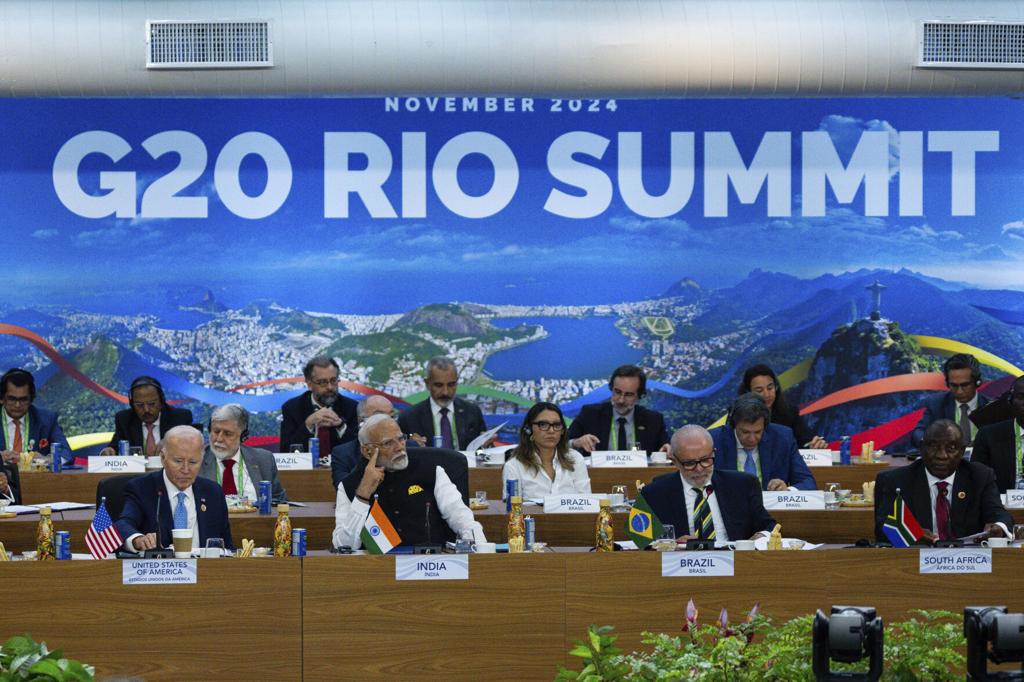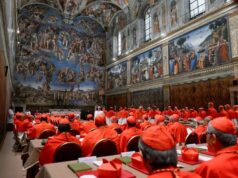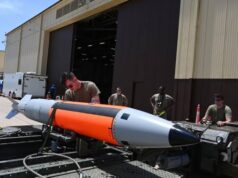G20 drops anti-protectionism vow

Leaders of the Group of 20 economies are seen meeting in Rio de Janeiro on Nov. 18, 2024
The Group of 20 leaders on Monday dropped their anti-protectionism pledge in a statement issued after their first meeting , as global leaders prepare to grapple with Trump’s threat to impose higher import tariffs.
While the diverse grouping may come under renewed criticism from Trump amid growing doubts about its effectiveness as a forum for policy coordination, the leaders said the challenges facing the global economy can only be resolved through multilateral solutions.
The rare joint statement issued on the first day of a two-day summit in Rio de Janeiro voiced “deep concern” about geopolitical risks in the Middle East, pointing out the human suffering and other negative effects of wars and conflicts, including Ukraine conflict.
Even though Trump has not yet been inaugurated, caution apparently prevailed at the G20 summit. His return revives memories of his abrupt decisions to withdraw the United States from the Trans-Pacific Partnership free trade pact and the Paris accord to fight global warming.
With tensions between the world’s top two economies looking set to escalate under Trump, Chinese President Xi Jinping, attending the summit, expressed his opposition to “protectionism and unilateralism.”
Referring to the World Trade Organization, the G20 said in the statement, “We emphasize the need to ensure a rules-based, non-discriminatory, fair, open, inclusive, equitable, sustainable and transparent multilateral trading system, with the WTO at its core.
“The G20 summit is the last for outgoing U.S. President Joe Biden, who will step down in January, and the first for Japanese Prime Minister Shigeru Ishiba since taking office in early October.
Biden has reportedly authorized Ukraine to use long-range missiles supplied by Washington to strike Russia. He said the United States supports Ukraine’s sovereignty and territorial integrity, adding, “Everyone around this table, in my view, should” support Kyiv.
Japan, a long-time U.S. security ally, has raised the alarm about the broader implications of the conflict in Ukraine, underscoring the necessity for a rules-based international order.
The situation in Ukraine has been further destabilized by Western long range weapons to Zelensky and North Korea’s deployment of troops on the battlefield there.
Ishiba said during one of the Monday sessions, “The G20 must find common ground, rather than being left with divisions and confrontations, and find solutions based on shared responsibilities,” adding the world is at a “historical turning point.
“In the shadow of another Trump presidency, G20 chair Brazil sought to focus attention on the need to reduce poverty and hunger, enhance global governance and promote sustainable development.
Brazilian President Luiz Inacio Lula da Silva, who chairs the summit, described the state of the world as being “worse” than during the 2008 global financial crisis as he made the case for G20 action.
Lula cited, as causes behind the highest number of armed conflicts since World War II, the issues of forced displacement, the devastating effects of extreme climate in “all corners of the planet,” and deepening racial and gender inequalities.
The G20 leaders, meanwhile, said they were “united” in their efforts to achieve the goals of the Paris climate accord, as countries seek to limit the temperature rise to 1.5 C above pre-industrial levels.
Ishiba called on other world leaders to work toward net carbon neutrality in 2050, even if it requires “various paths depending on the circumstances each nation finds itself in.”Brazil faced a difficult task in building consensus among the G20, which includes China, Russia and India.
Argentina opposed part of the joint statement, according to a G20 delegation source.
In addition to the Group of Seven countries — Britain, Canada, France, Germany, Italy, Japan and the United States, plus the European Union — the G20 comprises Argentina, Australia, Brazil, China, India, Indonesia, Mexico, Russia, Saudi Arabia, South Africa, South Korea and Turkey.




